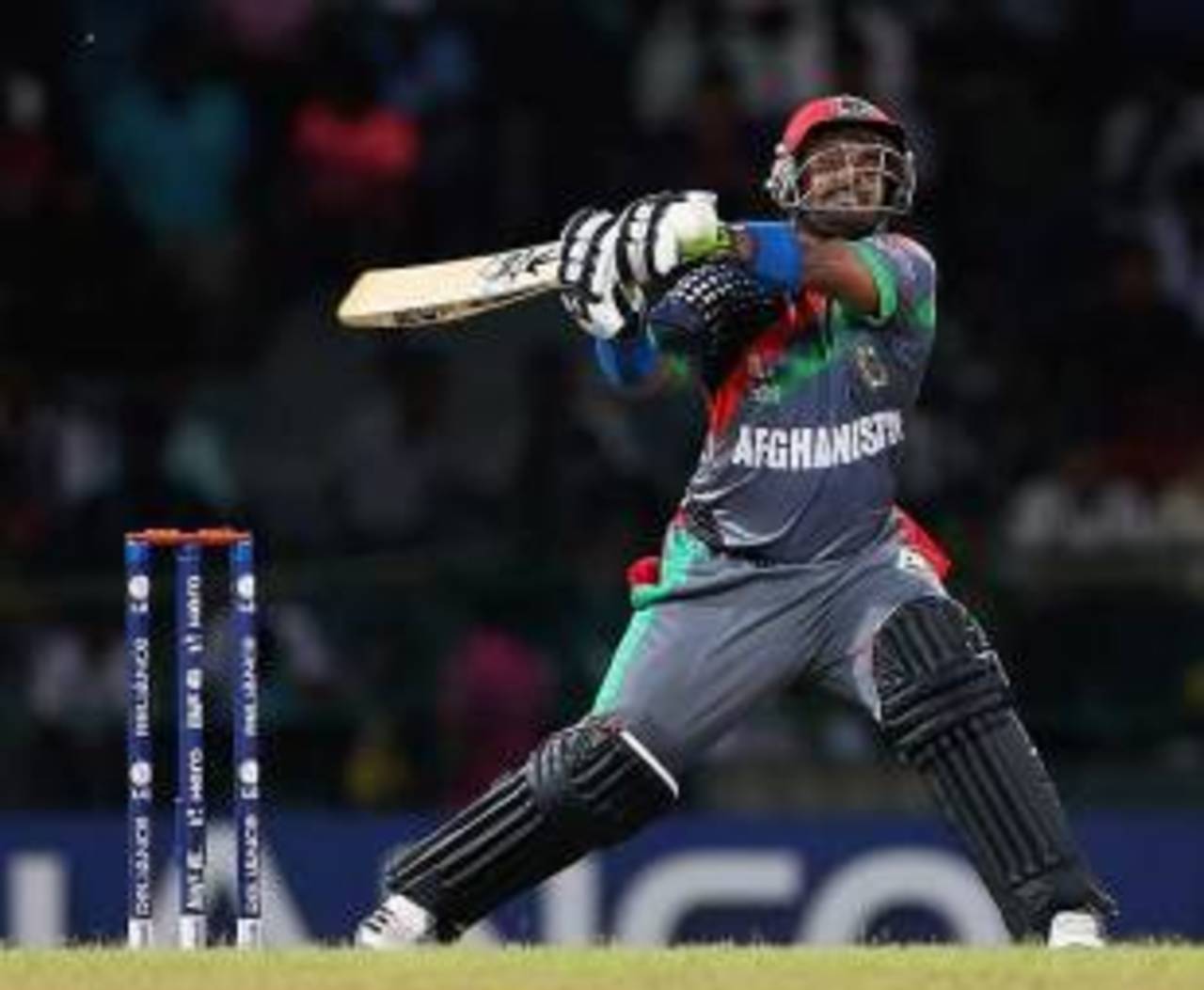Best of the rest
A look at some players who missed out on Test cricket because they came from Associate-member countries. (One from each nation.)

Afghanistan's Mohammad Shahzad scored a double-century to chase 494 against Canada • ICC/Getty
Seemingly the best of the many promising players who have inspired Afghanistan's climb up the world rankings, the chunky Shahzad has already hit three one-day international centuries - and 214 not out in an Intercontinental Cup game against Canada in Sharjah in February 2010, anchoring an incredible chase as Afghanistan reached 494 to win by six wickets. If we weren't restricted to one player per country, then Shahzad's team-mates Mohammad Nabi, a fine allrounder, and fast bowler Hamid Hassan would also be close to selection here.
A left-hander who made centuries against county-standard opposition in the 1960s, Raynor so impressed Garry Sobers during one game that, legend has it, Sobers asked that he should be given a trial for West Indies, only to be told that Bermuda was not affiliated to their board. When Raynor died in 2011, proceedings were held up in the Bermudian parliament as MPs paid tribute.
A fine batsman who at his best exuded something of the confidence of Viv Richards at the crease, Tikolo was the backbone of the strong Kenyan side that shocked West Indies in the 1996 World Cup and reached the semi-finals in 2003. With little competition for places, he played on for too long, but remains arguably the best batsman yet produced by one of the non-Test nations. His 31 centuries in all matches for Kenya included two doubles.
Gordon Greenidge and Viv Richards both reached 1000 ODI runs in just 22 matches. And next, in 24 games, comes... Ryan ten Doeschate of Netherlands. Granted, some of his runs were against fellow Associates, but it's still a mighty record: and ten Doeschate crashed World Cup hundreds against England and Ireland to emphasise his talent. If we weren't restricted to one player per country, his erstwhile orange-clad team-mates Roland Lefebvre (the first Dutchman to score a County Championship century) and long-serving batsman Tim de Leede might also feature.
A minister in the Church of Scotland, Aitchison never found the time for county cricket - but he did score 56 centuries in club cricket and seven for Scotland, including one off the 1956 Australians that Ray Lindwall and Keith Miller rated the best against them all summer. Worcestershire's Roly Jenkins was less impressed after a long, chancy innings, suggesting that with his luck the Rev Aitchison ought really to be an archbishop.
Namibia's big-hitting middle-order batsman Snyman would add punch to our team in limited-overs matches - if he can reproduce the form that brought him 230 (out of a completed innings of only 282, and including 11 sixes) against Kenya in January 2008, or 201 not out (only seven sixes this time) at Kenya's expense late in 2012.
There are several Irish candidates for our XI, notably canny spinners like Dermott Monteith and Scott Huey, but we need a wicketkeeper - and feisty O'Brien is good behind the stumps, and active in front of them too, as proved by several hundreds in county cricket and for Ireland. And he wouldn't be lost for words in this company: "I've said a few things to Kevin Pietersen," O'Brien admits, "and I'd like to think I've chirped him out a couple of times."
A Rhodes Scholar from Vancouver who bowled probing offspin for Oxford University in 1947 and 1948 - Trevor Bailey was among his six victims in the '47 Varsity Match - Robinson later captained a strong Canadian team that held its own with the counties on a tour of England in 1954. He later became a diplomat, wrote a biography of the Canadian prime minister John Diefenbaker, and a family history entitled This Family Robinson.

Undoubtedly the best cricketer ever produced by the United States, John Barton King was a fast bowler who swerved the ball disconcertingly. King toured England three times with the strong Philadelphia teams of his day, and actually topped the English first-class averages in 1908 (when he was 35) with 87 wickets at 11.01. That followed 72 at 20.10 in 1897, and 93 at 14.91 in 1903. In 1909 he took all ten wickets against a touring Irish team, and three years later he took 17 Australian wickets in two matches as they journeyed home from the Triangular Tournament in England.
A fine seamer who achieved near-cult status during a long county stint with Derbyshire, Mortensen emerged from club cricket in Denmark. Nicknamed "Erik Bloodaxe", he took more than 650 wickets in all formats over a dozen seasons from 1983. "He says little, and his appeal is presumably Danish for owzat," wrote Peter Roebuck. "He takes a dim view of fielding and, if he is moved from one spot to another, an even dimmer view of chasing any ball entering his previous domain." However, Roebuck added, "He is, though, a very fast bowler... Steaming in with his flailing black hair, he bowled me just about the best over I've ever received."
A purveyor of fast swing in his youth, Gibson of Eton was one of the schoolboy bowlers chosen as Cricketers of the Year by Wisden in 1918 in the absence of any first-class cricket in England. He went on to Cambridge University, and in 1921 took 6 for 64 for the all-amateur XI, raised by Archie MacLaren, that defeated the previously dominant Australian tourists. Gibson soon returned to his native Argentina, where he was a pillar of the local cricket scene. MacLaren apparently arranged for him to be invited to tour Australia for the 1924-25 Ashes, but Gibson declined.
Steven Lynch is the editor of the Wisden Guide to International Cricket 2013. Ask Steven is now on Facebook